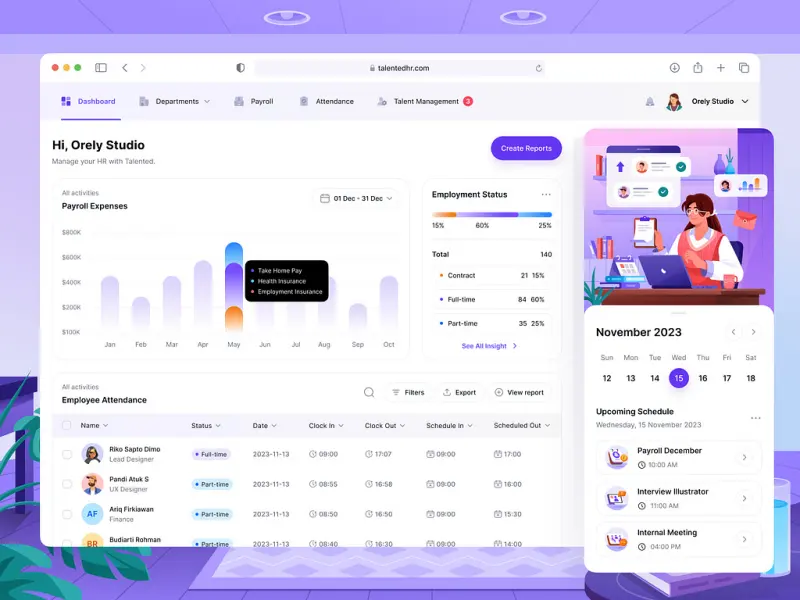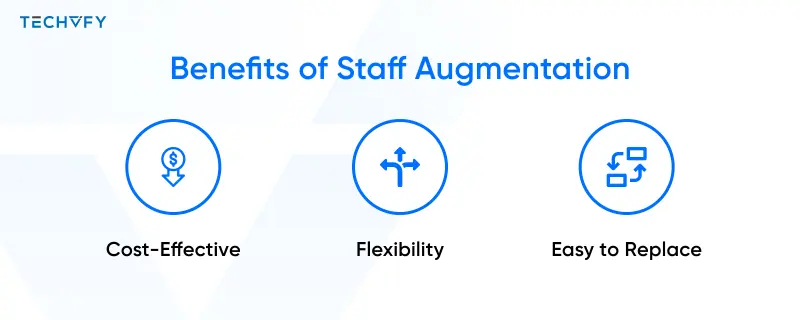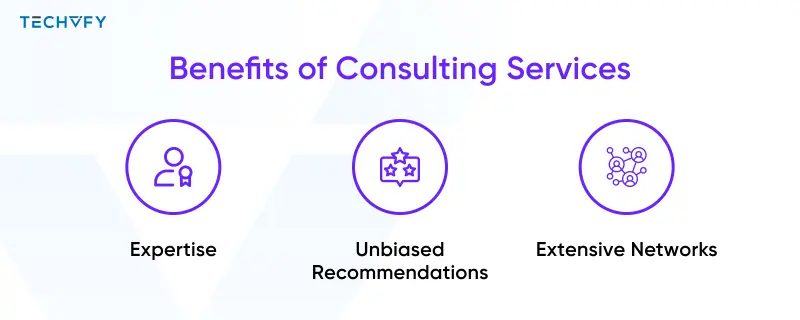Staff Augmentation vs Consulting – Choose The Right One For Your Project
- TECHVIFY Team
- 0 Comments
Deciding between staff augmentation and consulting can be challenging if you’re not clear on what each offers. Staff augmentation embeds skilled professionals directly into your team to fill capability gaps and move projects forward efficiently. These experts work alongside your existing staff to ensure smooth project execution. In contrast, consulting provides external strategic guidance, offering expert advice without being involved in the day-to-day execution of your project.
By the end of this article, you’ll be equipped to decide which option is best for your business. We’ll dive deeper into the key differences between staff augmentation vs consulting, giving you the clarity you need to decide which option fits your software development projects when your team is short-staffed.
I. Breakdown The Definition of Staff Augmentation And Consulting
What is Staff Augmentation?
Staff augmentation—also known as “flexible staffing” or “temporary staffing”—is a strategy that allows businesses to add skilled professionals to their workforce temporarily. Unlike consulting, staff augmentation focuses on filling immediate skill gaps rather than solving problems through strategic thinking or process optimization.
In a staff augmentation setup, a company brings in an external provider to offer short-term assistance with particular tasks, like integrating systems or creating new products. It’s a way to get the job done without the commitment of hiring permanent employees or going through the complexities of managing independent contractors.
Staff aug vs. consulting
What is Consulting?
Conversely, consulting is project-based and revolves around hiring external experts to offer specialized advice or services. Consultants are typically not employed by the client company. Instead, they are either independent contractors or employees of consulting firms who are brought in for a specific purpose, such as providing legal, financial, or technical advice.
Consulting is defined as “the practice of offering professional advice or services to clients in exchange for payment.” Consultants are often brought in to provide expertise that is hard to find internally or to fill a skills gap where the organization lacks the necessary in-house talent.
Learn More On:
II. The Key Advantages of Staff Augmentation and Consulting
Both staff augmentation and consulting services offer unique advantages for businesses, depending on their needs. Below, we explore the specific benefits of each approach and how they can impact your organization’s performance and project outcomes.
Key Benefits of Staff Augmentation
Staff augmentation can open up new perspectives for your projects, providing solutions that might not be immediately apparent. Here are some of the core benefits this model has to offer:
1. A Cost-Effective Way to Access Additional Help
A major benefit of staff augmentation is its cost-efficiency. You only pay for the extra employees when they are genuinely needed, avoiding the financial burden of long-term contracts. Once the project is completed, there’s no obligation to retain these workers. This eliminates the need for drawn-out hiring processes and ensures you aren’t stuck with full-time employees when the workload doesn’t justify it.
Staff augmentation is generally more affordable than project-based consulting because companies charge an hourly rate for their augmented staff, whereas consultants often have a set, higher service fee. Moreover, if you partner with a staffing agency, you won’t have to worry about additional overhead costs, such as office space or employee benefits like health insurance. The agency manages these aspects, allowing you to focus solely on the project at hand.
2. Unmatched Flexibility
The flexibility offered by staff augmentation is unparalleled. When your business encounters a surge in workload, you can quickly bring in extra hands without committing to permanent hires. Conversely, if the workload decreases, there’s no need to continue paying for employees you no longer require. This “on-demand” model allows you to respond swiftly to changing project requirements without being tied down by long-term commitments.
Benefits of Staff Augmentation
3. A Built-In Trial Period
Staff augmentation also functions as an informal trial period, enabling you to test an individual or team before making any long-term commitments. If the team members don’t align with your company culture or lack the necessary skill set, you can easily request a replacement or explore other staffing solutions. This flexibility reduces the risks associated with hiring and ensures that only the best talent remains part of your project.
Key Benefits of Consulting Services
Consulting offers different advantages, often overlapping with some of the benefits of staff augmentation. However, the unique focus of consulting on specialized expertise and strategic insights makes it a valuable option for many businesses.
1. Access to Specialized Consulting Expertise
Consultants are highly experienced professionals who often bring a wealth of knowledge from working with businesses similar to yours. Their expertise can offer deep insights and innovative plans customized to meet your unique requirements, assisting your business to grow and succeed. While staff augmentation also brings expertise to the table, consulting typically provides more specialized, strategic input that may not be available from an augmented team.
That said, augmented staff can also bring external knowledge to your organization, bolstering your internal team’s capabilities and expanding the scope of your project. While consulting often focuses on individuals, staff augmentation usually provides a complete team dedicated to helping you achieve your project goals efficiently.
2. Objective, Unbiased Recommendations
Consultants bring objectivity to the table, offering insights and recommendations that are free from internal biases. Since they aren’t emotionally invested in your company’s day-to-day operations, they can evaluate your business processes from a neutral standpoint. Their advice is based solely on what they believe will bring the most value to your organization.
Interestingly, staff augmentation can also offer objective viewpoints. When external professionals review your projects, guidelines, or technologies, they can provide fresh perspectives that may lead to immediate improvements. Having a few extra sets of eyes can often help uncover areas for optimization that might have been overlooked by internal teams.
Benefits of Consulting Service
3. Leveraging Extensive Networks
Another significant advantage of hiring consultants is their access to extensive professional networks. These networks can be a valuable asset, whether by connecting you with potential partners, investors, or even new customers. Consultants use these connections to help drive your business forward in ways that might not be possible without their involvement.
Similarly, companies that specialize in staff augmentation often have their own valuable networks. They can leverage these connections to enhance your projects by providing access to additional services or expertise, ensuring your project benefits from the best available resources.
Looking for Staff Augmentation Services?
TECHVIFY is the best option for you. Book a free consultation to get an accurate time and cost estimation for your staff augmentation needs.
III. The Key Differences Between Staff Augmentation vs Consulting
Below is a detailed table comparing Staff Augmentation vs Consulting across multiple areas, as per the provided insights:
| Aspect | Staff Augmentation | Consulting |
|---|---|---|
| Management | No management services are included. You’re responsible for assigning and reviewing tasks, as well as maintaining smooth workflow between team members. | The consulting firm manages all aspects, including talent coordination and project oversight. |
| Speed | You can quickly hire the necessary staff, often within a week. | Some consulting firms may have a waitlist or might start projects only at set intervals, like at the beginning of the month. |
| Cost | Typically, you don’t pay a large markup over the staff’s wages. | Consulting tends to be more expensive due to the added value of strategy, management, and proven processes, which come packaged with the service. |
| Customization | You can hire part-time or full-time staff based on your immediate staffing needs. | Consulting firms can provide customized project pitches based on your company’s specific needs, including scope, duration, and complexity. |
| Specialization | You can hire vetted professionals with specific skills relevant to your needs. | Consulting firms provide access to multiple specializations, offering a team approach to solve complex problems. |
| Strategy | No strategic direction is provided—it’s up to your internal team to align staff with broader business goals. | The firm will help you develop and execute strategies that align with your project goals and company objectives. |
| Infrastructure | No infrastructure is provided—staff rely on your internal systems and tools. | Consulting firms often provide necessary infrastructure, such as cloud platforms or DevOps tools, to support the project. |
| Onboarding | You’re responsible for onboarding new hires and getting them acquainted with your team and processes. | The consulting firm handles all onboarding and integrates team members behind the scenes, so you don’t have to worry about this step. |
| Ongoing Training | You’ll need to provide training as technologies or best practices evolve, and compensate staff for their time. | The consulting firm ensures the continuous development of their team and typically covers the costs for training, without passing it onto you. |
| Processes | You get the staff’s professional expertise but not necessarily the process improvements that come with optimized workflows. | Consulting firms bring optimized processes that you can observe and potentially adopt for future in-house projects. |
| Collaboration | Augmented staff can easily integrate into your in-house team and use the tools you already have, like Slack or Asana. | Consulting firms typically use their own collaboration platforms, and communication is often limited to your main point of contact rather than full team collaboration. |
| Communication | You can communicate with augmented staff freely, setting expectations and timelines based on your internal standards. | Consulting firms will follow their own communication protocols, which may be limited to specific working hours or time zones, and communication is often more formalized. |
| Control | You retain full control over the work, processes, and how staff execute tasks. | The consulting firm assumes control over individual collaborators, which can be beneficial if you lack experience in managing complex projects. |
| Flexibility | There are typically no long-term contracts, and you can scale up or down as needed by letting go of staff when they are no longer required. | Flexibility varies by firm. Some may require longer contracts, while others, like DevSquad, offer month-to-month arrangements without long-term commitments. |
| Focus on Outcomes | Staffing companies focus on connecting you with vetted talent, rather than ensuring specific project outcomes. | Consulting firms are outcome-driven and focus on delivering specific results using efficient strategies and processes. |
| Accountability | Staff are accountable only for the tasks you assign and the hours they work, with little responsibility for project outcomes or best practices. | Consulting firms are accountable for the project outcomes as laid out in the contract, ensuring they meet all agreed-upon deliverables. |
| Knowledge Transfer | It’s up to you to ensure that external staff pass on knowledge and skills to your internal team. | A good consulting firm will have established processes for transferring knowledge and best practices to your internal teams, ensuring smoother transitions. |
| Handover | Staff hired via augmentation can leave at any time, and there’s no guarantee of a thorough handover process for their work. | Consulting firms are accountable for the handover process and should provide comprehensive documentation and training to facilitate a seamless handover to your in-house team. |
| Security | Because augmented staff use your internal systems and processes, you have more control over cybersecurity risks. | Consulting firms have multiple people working on your project, which could introduce additional security risks. It’s important to gauge their security protocols before granting access to sensitive data. |
| Administrative Work | You pay the staff augmentation company directly, so you don’t have to worry about HR tasks like payroll management. | The consulting firm handles all employment logistics, including payroll and legal paperwork (W2s, W9s), so your responsibility is limited to paying the firm for their services. |
IV. Staff Augmentation vs Consulting: Which One To Choose
When Should a Company Opt for Staff Augmentation?
Staff augmentation is often the go-to strategy for businesses that need skilled professionals to support the execution of specific projects. In particular, this model is well-suited for organizations that require:
Agile Scalability
Staff augmentation offers companies the flexibility to adjust their staffing levels up or down depending on changing project needs, all without the hassle of renegotiating contracts or dealing with the complexities of permanent hiring. With this adaptable approach, businesses maintain full control over their projects, ensuring they can modify the level of engagement as circumstances evolve.
Continuous Operational Support
Staff augmentation is an excellent solution for organizations seeking ongoing support for operational tasks without a defined end point. Since these professionals are compensated on an hourly basis, companies can strategically utilize them to fulfill specific operational needs as they arise, ensuring that their processes remain seamless and uninterrupted.
Long-Term Collaboration Potential
One key benefit of staff augmentation is the opportunity to foster long-term relationships with freelancers or temporary staff. As these professionals work closely alongside in-house teams, businesses may eventually decide to transition them to full-time roles. By investing in training and integrating them into the company’s workflows, businesses can ensure that this talent remains available for future needs, creating a reliable pool of expertise.
Staff augmentation vs consulting
When Should a Company Opt for Project-Based Consulting?
Project-based consulting, on the other hand, is a more suitable choice for organizations that require specialized knowledge or skills that aren’t readily available within their existing teams. This model is particularly beneficial when companies need:
Structured Project Execution
A company hiring a consultant typically involves a well-defined project scope with clear timelines, deliverables, and budgets. This makes project-based consulting ideal for initiatives like developing new software solutions or implementing business strategies. By setting clear expectations, companies can ensure that the project stays on track and meets all outlined objectives.
Overcoming Internal Resource Limitations
Many organizations face constraints in terms of time, staffing, or budget, making it difficult to dedicate internal resources to a particular project. In such cases, hiring a consultant can offer a strategic advantage by providing fresh insights and expert guidance tailored to the company’s unique challenges. This allows the business to move forward without overextending its existing team.
Bridging Gaps in Expertise
Consulting is often viewed as a way to access expertise that isn’t available within the company. Whether a business is aiming to navigate a complex technological challenge or needs advice on a highly specialized domain, consultants bring the external knowledge required to achieve successful outcomes. This strategy is especially effective for solving talent shortages and addressing specific, short-term business needs that the internal team may not be equipped to handle.
This approach is particularly valuable for organizations that encounter unique challenges outside the scope of their usual operations, requiring expertise beyond the capabilities of their permanent workforce. Companies can confidently tackle these obstacles and meet their project goals by leveraging external consultants.
Conclusion
Deciding between staff augmentation and consulting comes down to what your business needs most—whether it’s the flexibility to quickly fill skill gaps and scale your team or the strategic insight to tackle complex challenges. Staff augmentation gives you the ability to integrate skilled professionals into your existing team, ensuring projects run smoothly without the long-term commitment of permanent hires. Consulting, on the other hand, offers specialized expertise and a fresh perspective to guide your business through high-level decisions.
If you’re looking for the right solution to meet your project demands, TECHVIFY is here to help. Whether you need to augment your team or seek expert consulting, we’re ready to provide the support you need. Contact TECHVIFY today for a free consultation and let us help you move your projects forward with confidence.
TECHVIFY – Global AI & Software Solutions Company
From Startups to Industry Leaders: TECHVIFY prioritizes results, not just deliverables. Accelerate your time to market and see ROI early with high-performing teams, AI (including GenAI) Software Solutions, and ODC (Offshore Development Center) services.
- Email: [email protected]
- Phone: (+84)24.77762.666









